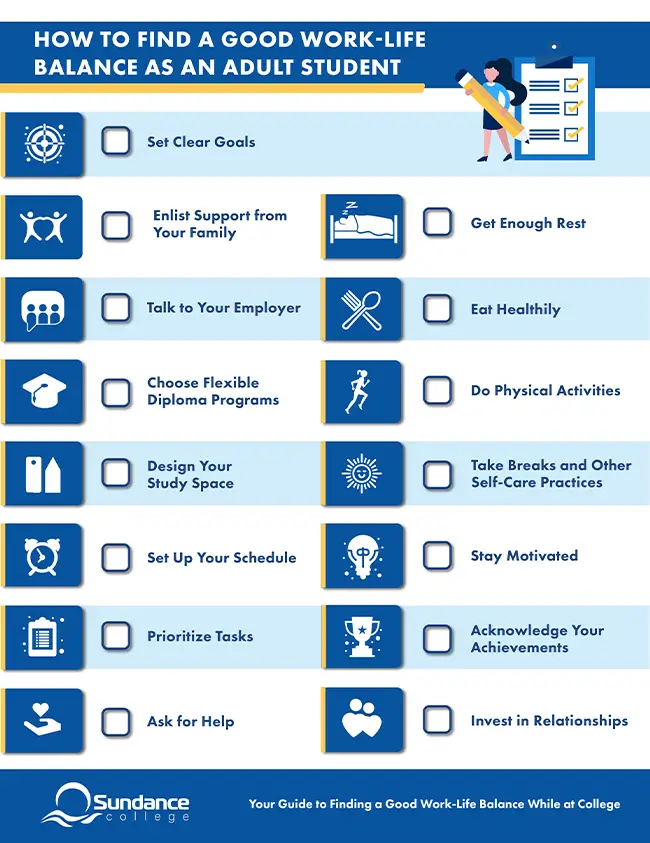Blog / Your Guide to Finding a Good Work-Life Balance While at College
Your Guide to Finding a Good Work-Life Balance While at College

Explore our Diploma Programs
- Business, Hospitality, and Legal
- Health and Human Services
- Technology
Table of Contents
Did you know that adults returning to college to improve their careers more often than not are married, have kids, and hold jobs?
This came from a recent report from Canada’s Employment and Social Development. It also revealed that the most common reasons for adults to refrain from pursuing post-secondary education are due to having family responsibilities, feeling they don’t have enough time for schoolwork, and a lack of support from their employers.
Isn’t it ironic? The very factors — work and family — that drive adults to become students again are also the biggest challenges in their path to academic and professional success.
If you’re considering enrolling in post-secondary education and wondering how you will manage your work, family, and school commitments, you’re not alone. With the right support, resources, and your dedication, you can achieve a good work-life balance while studying.
What makes us so confident about this?
We have numerous graduates who have successfully navigated their studies while being full-time parents and full-time workers. Among them is a remarkable mom of five (!) kids, ages 3 months old to 17 years old, Tashina M., who earned her General Business Management Diploma with honours!
In this article, you’ll get practical insights and strategies, as well as advice from graduates like Tashina, in juggling your work and family commitments while pursuing your Diploma and rewarding future. Let’s sort them all out!
Listen to “Your Guide to Finding a Good Work-Life Balance While at College”
Set Clear Goals
Adults return to college for different reasons, each fueled by unique motivations and life experiences.
For instance, Catherine V., enrolled in the Addictions and Community Health Professional (ACHP) program, shared:“I was married to an alcoholic for 30 years. And I could never really understand alcoholism. So, my biggest reason for taking the program was that I wanted to understand alcoholism. I wanted to understand why I chose a partner like that and why things happened in our marriage the way they did.”
Tashina’s primary goal in pursuing the General Business Manager (GBM) program was clear: “Being a single mom and running a business with hair services since 2013, I realized it’s now 2024 – that’s a significant gap in my education that I knew I needed to fill. Going back to school has always been a goal for me. Even before I enrolled in the Business Management program, I knew I would get there; it’s about making a dream come true. I want to be a good role model for my kids and for myself.”
Cargieli L. took her Digital Marketing and Social Media Management program to transition to her desired career field: “Since 2020, I’ve been working in a manufacturing company as an administrative assistant. However, I realized I needed to invest in myself, particularly in my education, to gain more knowledge and skills in sales. This would qualify me for future job opportunities.”
Like these graduates, you too have your own reasons for choosing a specific diploma program and envisioning what you hope to accomplish through your education.
Whether it’s personal growth, career advancement, or making a positive impact in your community, ensure your goals are clear and deeply meaningful to you. By clear goal setting from the outset, you’ll enhance your ability to stay focused and motivated, paving the way for a successful work-life balance during your college journey.
Enlist Support from Your Family
Being a full-time parent and a full-time worker are challenging roles on their own. Adding education for working adults to your schedule will require you to employ several strategies. One of them is to seek support from those around you — your family, friends, colleagues — to help lighten the load and create space for your studies.
Leah B., our ACHP graduate, recalls: “My support comes from all over. My immediate family — my mom, dad, and sister — played a significant role during this journey, rebuilding our trust and relationship. My best friend, who encouraged me to join the program, has been my rock.”
Leah also found practical solutions to manage her responsibilities: “I was fortunate to find full-time daycare for my daughter, provided by my best friend’s mom. This arrangement allowed me to work nights at a bar, giving me flexibility during the day to focus on my studies and spend evenings with my daughter.”
By delegating tasks and responsibilities like Leah, you can carve out valuable time for your studies while maintaining a balance with your other commitments. Remember, you don’t have to do it all alone! Embrace the support around you to achieve your academic goals.
Talk to Your Employer

Don’t hesitate to initiate conversations with your employer about your educational aspirations and discuss how they can support you in achieving your educational goals.
Many of our students engage in discussions with their employers about their career development goals before enrolling. These conversations result in employers supporting and encouraging their employees to pursue career-focused education. Why? Investing in their employees’ continuing education means employers can cultivate highly skilled teams capable of handling more complex tasks efficiently and effectively, fostering their business growth.
For example, Roslyn N., a General Business Manager graduate, had been working part-time with the Public Works Transit Department in an administrative role. After earning her GMB Diploma, she landed a full-time position as a fleet administrator, managing the city’s vehicle fleet and fuel systems.
Roslyn shares: “My supervisor was aware that I had been studying the GMB program in my spare time. When my practicum opportunity arose, he was prepared for it. We had been collaborating to establish a plan, and he fully supported it.”
Did you know that employers can take advantage of funding opportunities such as the Canada Job Grant to support their employees’ training and skill development? This grant covers up to two-thirds of approved training costs, with the employer paying the remaining one-third.
This means your employer can apply for funding on your behalf, benefiting both you and your employer in the long run! Need help? Fill in this form and our advisors will reach out to you to cover all your and your employers’ questions and explain the funding options to your employer, if needed.
Choose Flexible Diploma Programs
Nowadays, many adult students can’t afford to quit their jobs for full-time, in-person studies at college. They need to keep working to support their families. That’s why, in last couple of years, there has been a significant shift towards online self-paced learning. It offers flexibility and convenience, allowing adult students to manage their studies around their busy schedules and ensuring they can continue working while advancing their careers through distance education.
When we ask our graduates why they chose Sundance College, many, if not all, point to the flexibility of online learning as the top reason.
For example, Marla S., who graduated from the ACHP program, said: “I’m a mom of five kids and I work, and I just needed to have that flexibility from not having to be in a classroom, just like per se. I liked that I could join the classes when I had time or watch the classes in video recordings later.”
In the words of Roslyn N., our graduate of the CGBM program, regarding online learning: “You can still live your life, do all the other things you have to do in life, and get school done.”
Takeaway: If you’re aiming to achieve a good work-life balance, consider adding flexible online diploma programs to your toolkit.
Design Your Study Space

Having a dedicated study space is part of the effective study habits. It allows you to mentally transition into study mode and signals to others in your household that you are engaged in important work. This separation helps to establish boundaries and ensures that your study time is respected, even amidst busy schedules and competing demands.
For example, consider how the husband of our Pharmacy Assistant graduate Minerva C. took care about her study space:
“My husband always gives me support by giving me one room where I could study by myself, quietly. No kids or pets are allowed.”
Incorporating Minerva’s approach, design your study space to suit your needs and preferences. Whether it’s a quiet room, a cozy corner, or a well-organized desk, ensure that your study space promotes concentration, productivity, and ultimately, your academic success and well-being.
Set Up Your Schedule
As an aspiring adult student, you’ll need to make an effort to integrate work and education smoothly into your busy schedule.
Leah B., one of our ACHP graduates, explained what you may feel now: “I guess my main concern as of a single parent or someone who was working full time was that studying the program would be overwhelming; that I couldn’t fit all this in; that I was not going to succeed.”
However, Leah found that reaching out to instructors, other students, and leveraging available resources helped her navigate everything. She reflected, “There are so many people I’ve reached out to, from instructors to other students, and they helped me figure out that there’s always time in the day to do what you want to do, just look at it.”
Similarly, Marla S., balancing a job and five children, made time for studying in her schedule: “My job is 12 hours from the hospital, so after 7 a.m. to 7 p.m., then I go back, I go to the room, and study. That’s the time that I studied for at least 3 hours.”
Follow their examples and outline specific times in your day when you can dedicate to studying. With a well-planned schedule and support from your community, you can effectively manage your time and achieve success in balancing your work, family, and academic responsibilities.
Prioritize Tasks
Maintaining a good work-life balance as an adult student relies on effective time management and task prioritization techniques. Breaking tasks into smaller, manageable ones and setting clear goals helps you stay organized.
As a parent and full-time worker returning to school, you should remain flexible and be prepared for the unexpected. For instance, during her Communications and Interpersonal course as part of the General Business Management program, Rosalyn faced illness in her family: “My kids both got violently ill for a time. It was a two-week course, and ten out of those 14 days they were so, so sick, and I was scrambling.”
In these scenarios, it’s crucial to prioritize the immediate needs of your family. Once the urgent situation is managed, you can refocus your attention on your studies. Roslyn was able to navigate this challenge: “I reached out to my instructors and the Sundance College faculty, and they were able to help me pull it off.”
Always remember that the people around you at your college, including the staff, instructors, and other students, are all there to support you every step of the way on your academic and career journey. They can help you prioritize tasks and remain flexible. While problems may arise and priorities may shift, know that there is always a solution available — just don’t hesitate to ask for help when you need it.
Ask for Help

Asking for help is not a sign of weakness but rather a proactive step toward achieving your goals. Finding your work-life balance while studying often requires seeking support from various sources, including family, friends, employers, coworkers, faculty, and fellow students.
As for our graduates, during our graduation ceremony in Winnipeg, Tashina M., our valedictorian and honours graduate of the General Business Management diploma program, expressed gratitude for her five children, emphasizing their crucial support: “I wouldn’t be here today without the love and support of my kids. They inspire me daily to be my best. My oldest daughter, thank you for always being there, especially during tough times, assisting with your siblings while I managed my schoolwork and family. To my other three kids, thank you for being amazing big sisters and a big brother to your baby sister.”
Prakass T., who graduated from our Network Systems Manager program, shared he received lots of support from his instructors during his time with Sundance: “Instructors work 8 a.m. to 4:30 p.m. Whenever a student needs help, they are available even after hours like six, seven, eight, nine. They always help you do this or that course of the program, do the home assignment right, and many more.”
These stories illustrate that reaching out for assistance from those around you can make a significant difference in balancing work and study. Don’t hesitate to lean on your support network and ask for help when needed — it can be the key to your success.
Get Enough Rest
Getting enough rest is essential for maintaining a healthy work-life balance while at college. Most adults need 7 to 9 hours of sleep each night, although your needs may vary.
During times of increased stress or busy schedules, taking short naps (15-25 minutes) can also be beneficial for restoring energy levels and improving cognitive function. Incorporating regular sleep and rest into your routine can help you stay focused and motivated, better developing your multitasking skills. All of which are required when balancing work and study with other responsibilities.
Eat Healthily
No, we’re not asking you to start a complete overhaul of your diet or enroll in a healthy cooking marathon while juggling responsibilities at home, work, and college. Consider incorporating foods that are known to boost brainpower into your diet.
Some brain-boosting foods include:
- Green, leafy vegetables
- Fatty fish
- Berries
- Dark chocolate
- Walnuts
These foods are rich in nutrients like Omega-3 fatty acids, antioxidants, and caffeine, which can help improve cognitive function, enhance memory, and increase alertness. By making simple swaps or additions to your meals, you can fuel your body and brain for optimal performance in both your academic and personal pursuits.
Do Physical Activities
Once again, we’re not asking you to set ambitious fitness goals or start a journey to transform your body while juggling the demands of college life, full-time work, and other commitments. Instead, consider incorporating simple, moderate-intensity exercises into your daily routine during your diploma program.
Activities like walking, jogging, yoga, or tai chi — just 15 to 30 minutes a day — can improve your learning skills. Numerous studies suggest that regular exercise not only benefits physical health but also enhances cognitive function. These exercises can indirectly improve memory and brain power by boosting your mood, helping to regulate sleep and effectively manage stress and anxiety.
Take Breaks and Other Self-Care Practices

Minimizing distractions such as social media, television, and other non-essential activities can help you make the most of your study time. Taking regular breaks throughout your study sessions is one of the most effective productivity techniques, essential for preventing burnout.
One effective strategy for managing study sessions is to try out the Pomodoro Technique. This technique involves working in short, focused bursts of time (typically 25 minutes) followed by a short break (5 minutes). After completing four Pomodoro sessions, take a longer break (15-30 minutes) to rest and recharge.
Don’t hesitate to implement other self-care practices into your study routine, such as lighting a scented candle, filling a Pinterest board with motivational quotes and inspiring pictures, or just buying yourself flowers. By incorporating self-care into your study routine, you can enhance your ability to achieve a healthy work-life balance while pursuing your educational goals.
Stay Motivated
Balancing work, life, and college as an adult student requires careful time management, but it also brings the rewarding opportunity to fulfill personal and professional aspirations. Here are some additional academic success tips to help you stay focused and inspired:
- Stay Connected to Your Why: Remind yourself of the reasons why you started your educational journey. Whether it’s personal growth, career advancement, or making a difference, keeping your goals in mind can fuel your motivation.
- Practice Self-Compassion: Be kind to yourself and acknowledge that setbacks are a normal part of the learning process. Treat yourself with the same compassion and understanding you would offer to a friend.
- Celebrate Progress: Acknowledge and celebrate your achievements, no matter how small. Recognizing your progress can boost motivation and morale.
By implementing these strategies, you can cultivate a sense of motivation and resilience to overcome challenges and achieve success in your academic and career endeavors.
Acknowledge Your Achievements
Celebrating your progress is so important that we decided to highlight it in a separate section. At Sundance College, we want to make sure every milestone, no matter how small, is celebrated with enthusiasm. Our flexible learning system lets students focus on one course at a time, turning each completion into a significant achievement worth recognizing.
By acknowledging and celebrating your accomplishments, you not only honor your hard work but also inspire those around you. That is another critical component of your good work-life balance as an adult student.
Invest in Relationships
In your journey as an adult student, investing in relationships is paramount to your success. Whether it’s with your family, friends, colleagues, employers, or college faculty, nurturing these connections can provide invaluable support and guidance along the way.
For example, Leah B., our ACHP graduate, found mentorship and inspiration in her instructor, Jordan: “He took a lot of the online courses that I also want to take, and it is nice to have that relationship where we can connect on that level, and I can learn and see how far one can go.”
Just as Leah experienced, your instructor may serve you as a mentor, guiding you through academic challenges and career aspirations. Colleagues and classmates can offer support and collaboration, enhancing your learning experience and networking opportunities. In times of need, these relationships become lifelines, providing encouragement and assistance.
Remember, success is not achieved alone but through the collective effort of those who support and believe in you. Take the time to cultivate meaningful connections and build bridges that will carry you towards your educational and professional goals.

Sustain Your Well-Being Through Sundance College’s Programs
At Sundance College, we prioritize your well-being alongside your academic success and professional development. Our comprehensive support services help you maintain a healthy work-life-school balance. With 24/7 mental health support, tech assistance, faculty mentorship, and career guidance, you have access to the resources you need to thrive in learning while working and parenting.
As Roslyn, our General Business Management graduate, shares, “Graduating from Sundance College has rekindled the drive in me that I forgot I had. It’s opened a whole bunch of new possibilities, and this is just the beginning.”
Start your educational journey with confidence, knowing that we’re here to support your well-being and success every step of the way.
Subscribe for more career advice
Blog Categories
Share on:
